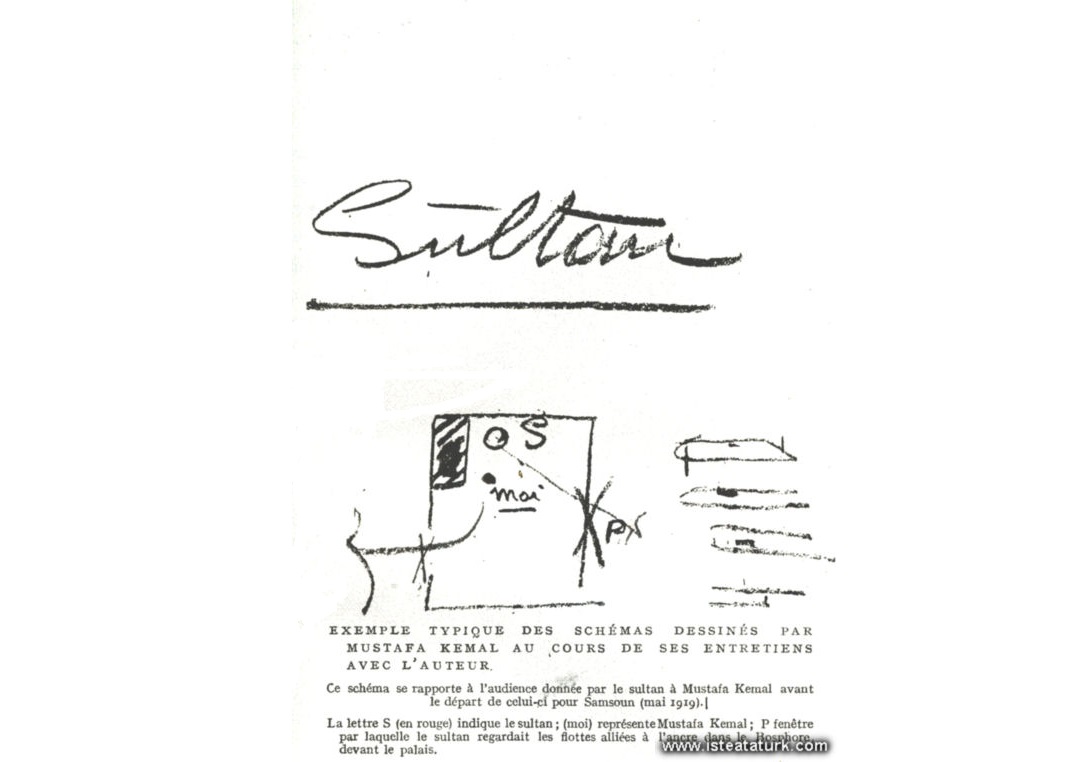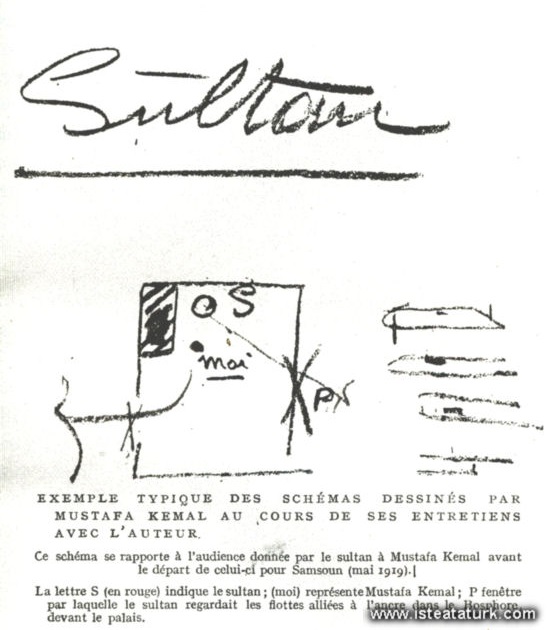
Mustafa Kemal Atatürk's last meeting with Sultan Vahdettin, Yıldız Palace, Istanbul, (05.1919)
Character Size
Mustafa Kemal Atatürk's last meeting with Sultan Vahdettin, Yıldız Palace, Istanbul, (May 1919)
Yıldız Palace, Istanbul, May 1919
General Charles H. Sherrill* states that his meetings with Atatürk are different from those he had with other western leaders. He explains the reason as follows;
-"Mustafa Kemal's way of explaining the subject. During the Gazi talks, he would sometimes take a piece of paper from the table in front of him, draw sketches, maps and diagrams with colored pencils, so he would show the war or the places where the incident took place and the positions of the people mentioned with figures. For example, Mustafa Kemal, He described his last meeting with the sultan before moving to Samsun as follows."
- "When I entered the room, the sultan was sitting by a table over there (he had marked the location of the sultan with a red pen in his quick sketch of the room). I was here (dotted with a blue pen here). There was a window (he had put a letter P where the window was). He was constantly looking out the window while talking to me."
I eagerly asked:
"I wonder what was outside the window?"
Before answering this question, Mustafa Kemal drew a sketch of the ships with a blue pen on the paper in front of him and then turned to me:
" He was looking at the Allied navy anchored in the Bosphorus, just across the Star Palace," he said.
Thus, as if you had been in this meeting, you would have seen everything and listened to every conversation.

The sketch that Mustafa Kemal Atatürk drew for General Charles H. Sherrill to describe his last meeting with Sultan Vahdettin .
Now let's listen to the details of the departure meeting between the first President of the Republic of Turkey and the last sultan of the Ottoman sultanate from Atatürk:
- "In a small hall of Yıldız Palace, Vahdettin and I sat almost knee-deep. There is a table on his right with his elbow on it and a book on it. This is the view we see from the window of the hall that opens towards the Bosphorus. Enemy battleships on parallel lines. "It was as if the cannons on their side were aimed at Yıldız Palace! It was enough to turn our heads from our seats to see the view. Vahdettin began to speak with these words that I will never forget:
"Pasha pasha, you have served the state so much, all of them are now included in this book (he pressed his hand on the book I just mentioned and added it:) it has gone down in history." That's when I realized it was a history book. I was listening intently and quietly:
"Forget about this, he said, the service you will do now may be the most important of all. Pasha pasha, you can save the state!" I was stunned by these last words. Is Vahdettin talking to me sincerely? Was it Vahdettin who was trying to save his state and reign by seeking contact with the hundredth degree instruments of foreign governments, did he regret all he had done? Did he realize he had been cheated on? But I considered it dangerous to make other bets with such a prediction. I gave him simple answers: "I thank you for the favor and trust in me. Please be assured that I will not fail in my service." While I was speaking, I was also trying to clear the conundrum in my head. In his heirship, in his sultanate, all his feelings and ideas, which I understand very well, How could I expect a lofty and noble act from a man whose dispositions I knew? It is necessary to save the country, I could do it if I wanted to. How? I decided immediately: Vahdettin meant that we have no strength. Our only support is to comply with the policies of those who dominate Istanbul. My job is to deal with the issues they complain about. If I could please them, convince the country and the people that this policy is correct, and tame the Turks who oppose this policy, I would have fulfilled Vahdettin's wishes.
"Don't worry, sir," I said, "I understood your point of view, if you have the will, I will act immediately and I will not forget for a moment what you commanded me." "Be successful!" After I was honored with his glorious address, I left his presence. Naci Pasha, the sultan's aide, but my teacher, met with me immediately. He was holding something in his hand in a small enclosure. He said, "A little remembrance of His Excellency." It was a watch with Vahdettin's initiations engraved on its cover: "Okay, thank you," I said.
"Then we walked away from the palace, as if we wanted to hide, hide that we were leaving Yıldız Palace and were about to move, afraid of making our feet clatter."
*U.S. Ambassador General Sherrill
General Charles H. Sherrill (1867-1936), a diplomat, lawyer, and historian, was the U.S. Ambassador to Argentina from 1909-1911. During the First World Wars, he served in New York State as a brigadier general in charge of recruitment and as a general conveying orders to the army. On March 17, 1932, he was appointed to Ankara as the plenipotentiary extraordinary ambassador of the USA. He presented his credentials on 20 May 1932. His term ended on March 23, 1933.
Source: 1-Çankaya, Falih Rıfkı Atay, Pozitif Yayınları, ISBN: 975-6461-05-5 Sayfa:187-188
2- Mustafa Kemal'in Bana Anlattıkları, General Charles H. Sherrill, Örgün Yayınevi 2007, ISBN:978-975-7651-62-8. Sayfa:107